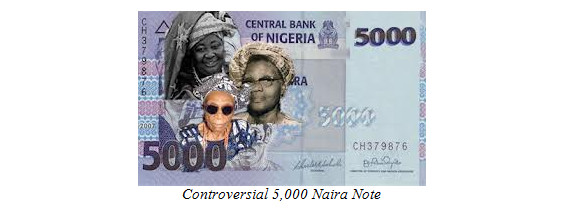5,000 NAIRA NOTE CONTROVERSY

Recently, Sanusi Lamido Sanusi, the Governor of the Central Bank of Nigeria (CBN) announced that the apex bank will be commissioning a new 5,000 Naira note featuring 3 not-so famous Nigerian women from different ethnic groups. There was even a talk that it should have featured the picture of late Dim Chukwuemeka Odumegwu Ojukwu.
The announcement has caused a lot of controversy and generated debate with people almost equally divided on both sides. Of course, it will cost less to produce one 5,000 note than five 1,000 Naira note. However, opponents of the new note claim it will increase both corruption and inflation. Even the Nigerian Labour Congress (NLC) is not left out of the controversy and in a recent statement by its President Comrade Abdulwaheed Omar, the NLC said it will ask for increase in the salary of its members if the 5,000 Naira note is introduced. Apparently, NLC believes in the fallacy that a high Naira note will result in inflation.

It will be informative if we look at the history of the Nigerian naira as a backdrop to understanding the arguments. Our currency has a colorful history. There was a time we did trade by batter and later moved to cowries. Thereafter, West African Currency Board (WACB) issued us currency notes during our colonial period. The Central Bank of Nigeria (CBN) took over from WACB and issued us notes in 1959, another set after independence in 1962 and in 1968 during the bloody civil war. In 1973 we gained financial independence when we stopped using British pounds and started using our own Naira. At that time, one pound was equivalent to 2 Naira. Some youths will not believe that the country had ½ kobo (half kobo) coin in 1973 that was useful, especially since they cannot buy anything today with 50 kobo, the lowest coin in circulation.
Those of us who were alive during and after the assassination of late Gen Murtala Muhammad in 1976, remember the mood of the country. So, it was only befitting that in 1977, a new 20 Naira note was introduced with his picture on it. Gen. Murtala Muhammad made history as the first Nigerian citizen to have his picture on our Naira. Prior to that, we were still suffering from mental slavery by the continued portrait of the Queen of England on our currency even though we had supposedly gained “freedom” through independence in 1960. Two years later (1979), the N1, N5, and N10 notes were issued, but the N1 note was changed to coins in 1991 at the same time the 50 kobo coin was introduced. The N100 note came into existence in 1999 while the N200 note was commissioned a year later in 2000. Of course, we have the N500 banknote from 2001 and the N1000 colourful banknote seven years ago (2005). The only other major changes occurred in 2007, when the existing naira notes were re-issued with the new designs we have today (paper to polymer currency), and CBN introduced a new N2 coin which I have never seen physically. The current CBN Governor completed the full change to polymer currency after he took over in 2009 without issuing a new higher denomination.

Those of us who have lived abroad know how some Nigerians (mostly politicians) used to visit and ostentatiously display their booty in foreign currency. Interestingly, one US Dollar equals 160 Naira and one Euro equals 200 Naira, while one pound is approximately 250 Naira today. The largest denomination of the US dollar in circulation is $100, meaning that if I have it in my wallet, I have 16,000 Naira. What then is the value of our Naira. Alright so, we are spendthrifts in Nigeria. There is the joke that a rock star was at a high-end store in Europe and saw this black man shopping and spending with reckless abandon. The rock star could not help himself and finally approached the black man to ask whether he was a famous actor or what? When the black man answered that he was a Nigerian, the rock star exclaimed “of course!”
In fact, it is better to practice corruption or bribery with foreign currency that the Nigerian Naira. All recent cases involving corruption allegations are in dollars. Coincidentally, most contracts in Nigeria are even quoted in dollar. This is what CBN and economists will term “the dollarization of the Nigerian economy.” It is much neater to hand you an envelop with 100,000 dollars (1000 clean $100 notes) than 16,000 crisp N1,000 note or even 3,200 of the new proposed 5,000 Naira notes. Can you imagine how bulky it would have been to convert the $620,000 allegedly used in the Lawan v. Otedola matter, even using the new 5,000 Naira note? What about the $15 million sitting in CBN vault?
As it relates to financial crimes, corruption and fraud in general, it has been with us for a long time. If you read my textbook on Financial Crimes Law & Fraud Management (Chapter 2, page 15), you will see that corruption has been with us a long time. Even some of our “founding fathers” had corruption allegations leveled against them and sustained as far back as 1943. Also, the CBN cash-less or cash-lite policy is irrelevant here. You can still have large or small denominations in your wallet and realize the value of electronic transactions like the rest of the world. The cash reporting policy and anti-money laundering laws are supposed to curb some of the current fraudulent practices.
If you review our financial or economic history over the past 40 years, you will be shocked to know that during the Alhaji Shehu Shagari/Dr. Alex Ekwueme regime in 1980 we had the best value for Naira in comparison to the US dollar. At that time, one Naira was worth two US$ or stated in reverse, one dollar was worth 50 kobo. Things got worse after the military took over and the dollar first overtook us in value during General Ibrahim Badamasi Babandiga's regime in 1986, with only a slight reprieve in 2007/2008 during Professor Chukwuma Soludo's tenure as CBN governor because of high oil revenues. Today, the dollar has overwhelmed the Naira in value probably beyond the point of recovery.
As you can see, the Naira denomination is not our problem. Our problem is the cancer called corruption and lack of fiscal responsibility with a burgeoning inflation rate of 13, 7% as of 2011. We are devoid of visionary leadership and suffer from dearth of sound economic policies. Our problem is the trumping of true federalism and the evil called federal allocation to States without their proportionate contribution to the national cake. Yes, our problem is an over bloated recurrent expenditure with a large chunk going to the National Assembly. Our problem is unemployed youths and ethno-religious violence. Our problem is non-functional or non-existent Local Government Areas (LGAs) so that the dividends of democracy do not reach the grassroots. We can go back to using 20 Naira note from 1977 as the largest denomination available and there will still be corruption until we deal with our problems and crush evil in its path. Until then, Sanusi please give me even a 10,000 Naira note! And unlike P Square, if you chop my money, I care.
Prof Alex Osondu Atawa Akpodiete is an author, Computer Scientist, Educator, Consultant, lawyer, Political Analyst & Social commentator. He has a Doctorate degree in Jurisprudence from the US. He has lectured Law, Ethics and Security & Intelligence Studies at the University level here in Nigeria and US. He also writes for a state daily newspaper & national monthly journal. He currently divides his time between Nigeria and USA where he runs an international capacity building firm ATAWA GROUP. Contact him on 08138391661 or [email protected]. He is also on Facebook and you can follow him on Twitter.
